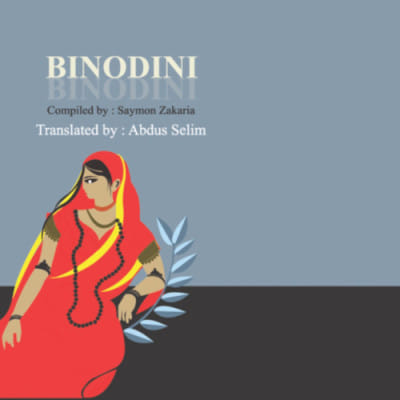The life journey of a theatre actress

Charitrya Prokashoni , February 2016
Binodini is the life story adapted from her two autobiographical notes titled My Story and My Stage Acting. The stage version of Binodini is researched and compiled by a renowned folk researcher Saymon Zakaria. Of late, Abdus Selim, who won 2015 Bangla Academy Award, has brilliantly translated the play Binodini in English. Let me share the story of the translator behind the translation of the play. Afterwards, the review will discuss different facets of the play. Abdus Selim wrote in his introduction to English version of Binodini: "Perhaps it was in August, 2015 Nasir Uddin Yousuff forwarded a mail to me that he received from Claire Pamment, a scholar in residence at Yale University. She expressed her willingness to include the play in the reading list of her students for the ensuing Fall 2015 semester if she could get hold of a translated version of the same in English. The forwarded mail incentivised me instantly and I finished translating the play by mid-September…"
The play opens with the life-sketch of Binodini. The readers will get an overall idea regarding how Binodini, born in a destitute family of Kolkata city, stepped into an unknown world of theatre. The part entitled Debut Acting informs us the brief history of Binodini's debut acting experience. Binodini felt tremendously surprised and excited after she had performed as queen on the stage many times but the memories of her first performance are unforgettable. Her feelings in her own words: "After that many a times I appeared as queen on the stage and also did many other characters but whenever I reminisce about my first stage appearance I feel as if I'm dreaming a sweet dream although it was an insignificant role of a maidservant."
The second chapter of the play titled Second Appearance describes how she played the role of princess in Harala Roi's Hemlata. Binodini acknowledged in her soliloquies that though she did not have any quality to play the role of princess, she had all longing to learn.
The next chapter analyses how Binodini and her theatre group Great National Theatre Company faced trouble while performing on a stage in Lucknow. One of the most interesting parts of the book is Binodini in the role of multiple characters of Meghnad Badh Kabyo. The chapter analyses her roles of Shita and Promila. De facto, the part of the book provides us with Binodini's experiences of playing different roles in Meghnad Badh Kabyo.
Afterwards, a chapter narrates the incident of the sudden demise of Umichandbabu. The play will inform the readers the death made everyone deeply shocked. The part also brings into focus how much Binodini was indebted to Girishbabu Mohashoi, a dedicated soul for theatre. The last twenty pages of the book include the story of the pathetic end of Binodini's first love, the tales of the ups and downs of the Star Theatre, the happenings associated with Binodini's forced retirement etc.
While doing the translation, Abdus Selim has exclusively maintained the conversational tone. Moreover, he has added a chapter of annotations at the end of his English version of Binodini to provide both Bengali and non-Bengali readers with a full account of the connotations of Bengali words used in the play. In a word, Selim's facile diction will easily draw readers' attention to discover the unknown tales of Binodini's life. Furthermore, the review must recollect Saymon Zakaria whose research and compilation has made the play reader-friendly.
I would like to end this piece of writing quoting the last words of Binodini which were wandering in the realms of my mind after coming across the play:
"Listen up all lucky ones and turn away your faces from me! And oh the shelter giver to the orphans, God from the paradise, you too listen! Be it God or man! It's easier said than done, Love doesn't change your fate, my dear! Love doesn't change anything! Look, my cremated ashes are floating like fallouts and lamenting ceaselessly. Oh! I have no end and no beginning either! ...That's my identity.
Yours,
Sreemoti Binodini Dasi, a mortified, rootless prostitute."
The reviewer is a critic. He teaches English at Central Women's University (CWU).

 For all latest news, follow The Daily Star's Google News channel.
For all latest news, follow The Daily Star's Google News channel. 



Comments